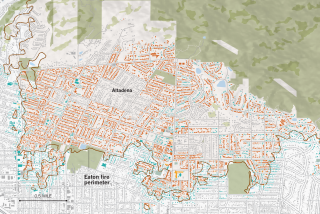After frantic evacuations, Palisades residents desperate to access homes

- Share via
- Pacific Palisades residents seeking to access their homes say they are frustrated after being turned away at checkpoints that restrict access to the evacuation zones.
- Authorities say the checkpoints are necessary to keep the area safe and secure.
- The LAPD is offering escorts to Palisades residents seeking to retrieve necessities at checkpoints between 6 a.m. and 6 p.m.
Michelle Sy just wants to get her two sons’ Nintendo Switch. That and her mother’s cancer medication, the 9-year-old’s EpiPen and their family photo albums. But mainly the Switch.
She and her husband, Bendick, had just 20 minutes to pack their car and evacuate as the Palisades fire bore down on their Pacific Palisades home Tuesday night.
They grabbed Michelle’s Kindle, Bendick’s laptop, some important documents, and the boys’ stuffed animals and Pokémon cards, and headed to their relatives’ house in Cerritos.
“I knew they would cry if I didn’t save their Pokémon cards,” said Michelle, 42.
On Friday, the couple left their kids with Michelle’s parents and made the hour’s drive from Cerritos to Santa Monica. Their goal was to collect their belongings from their and their septuagenarian parents’ houses, which neighbors have told them remain standing while many houses around them have been reduced to rubble.
Coverage of the fires ravaging Altadena, Malibu, Pacific Palisades and Pasadena, including stories about the devastation, issues firefighters faced and the weather.
They were among the many Pacific Palisades residents who have been turned away at the checkpoints that ring the evacuation zone that has spread across much of the neighborhood and surrounding areas this week.
For much of Wednesday and Thursday, people say the lockdown was significantly less strict and many displaced families were able to access the areas on foot, bicycle or e-bike. By Friday, even pedestrians were being blocked from entering.
The increased security Friday came a day after police reported that 20 people were arrested on suspicion of looting homes in L.A. County wildfire zones.
The Sy family arrived in Santa Monica in their blue minivan shortly before 2 p.m. and headed to the California Incline. Within seconds, a Santa Monica police officer told them they couldn’t proceed onto the ramp connecting Ocean Boulevard to Pacific Coast Highway.
“Hi, we’re residents. Can we get medicines?” Bendick, 46, yelled from the van window.
“Not right now,” the officer barked back, then directed them to park and walk back if they wanted to talk further.
When they got back to the Incline, they spoke with two members of the National Guard.
“Locals aren’t allowed to drive in. It’s just firefighters, police, some press,” one said. “But anyone is free to actually walk over there.”
Erika Aklufi, a spokesperson for the Santa Monica Police Department, said it tightened security at its checkpoints between Wednesday and Thursday because they “just couldn’t handle the volume of people” who were trying to access the burn zone. The goal was to “funnel” people to LAPD-managed checkpoints, where people could request police escorts to their homes.
“I don’t think you understand how much of a problem we’ve had with people trying to get in,” she said. “It wasn’t trying to be punitive in any way; it was really trying to help manage a chaotic situation.”
Coverage of the fires ravaging Altadena, Malibu, Pacific Palisades and Pasadena, including stories about the devastation, issues firefighters faced and the weather.
LAPD Sgt. Hector Guzman said residents can go to any of seven checkpoints between 6 a.m. and 6 p.m. and can be escorted to retrieve necessities. The locations are: Sunset Boulevard and Kenter Avenue, Sunset Boulevard and Kenter Avenue, Sunset Boulevard and Pacific Coast Highway, Sunset Boulevard and Amalfi Drive, Temescal Canyon Road and Pacific Coast Highway, Channel Road and Pacific Coast Highway, and Amalfi Drive and Channel Road.
The Sys weren’t interested in walking five miles through burning hills to their home, and then five miles back with their belongings. So they argued their case there on the Santa Monica street, trying to find an angle that would allow them past the makeshift checkpoint in a vehicle. They mentioned the needed medications, their treasured belongings, their belief that they should be allowed as residents to return to their own homes.
“My house is still standing,” Bendick pleaded. “So I’m actually worried about the looters.”
No luck. The Guard members told them Santa Monica police weren’t allowing anyone through.
They headed toward a checkpoint near the Brentwood Country Mart, but even before they got there it was clear they wouldn’t be getting by. Nobody else seemed to be. They didn’t even try.
“I almost broke yesterday because this is so sad,” Michelle said as they sat in their van considering their next move. “I was hoping today to get some of my stuff and some of the stuff on Jacob’s list,” she added, referring to their 13-year-old.
“He wants his books, his trophies,” Bendick said, reading through a hand-scrawled list of wanted items Jacob had asked them to fetch. “He wants his black belt, and even his dojo is gone.”
Some other residents weren’t as easily deterred. Some of those who chose to walk up PCH tried their luck hitchhiking with the few vehicles that had been able to cross into the evacuation zone.
Even if they made it to Pacific Palisades, the journey was far from over.
Family members checking on the homes of relatives were turned away by Los Angeles police officers guarding the neighborhoods of winding streets because they didn’t have IDs showing local addresses. Residents were shuffled into lines where some had to wait for hours for an official escort.
At the checkpoint at Sunset Boulevard, the crowd hummed with anxiety. One couple tried — unsuccessfully — to break through on bikes. Another couple tried on foot, feigning oblivion to the officers blocking the road.
“We live there!” exclaimed resident Ivo Venkov as he was waved down by an LAPD officer.
It didn’t matter. He and his wife, Rossi, were told to put their name on a list and wait their turn, which, they quickly learned, could take hours.
“The thing is — people are saying they have medication to get,” the officer explained to the crowd. “But they’re going inside and grabbing everything.”
Coverage of the fires ravaging Altadena, Malibu, Pacific Palisades and Pasadena, including stories about the devastation, issues firefighters faced and the weather.
It’s hard to blame them. All had fled with a tiny fraction of their belongings as flames crept nearer to their homes.
“It was like a medieval description of the inferno,” Venkov said of his evacuation. “Dante, Bosch, you name it.”
One woman had been waiting patiently for an hour and a half to see whether she even had a home. The answer lay just around the curve, about 300 yards from where she stood.
“We’re doing our best with one little pickup truck and two staffers,” said Juan Fregoso, district director for Los Angeles City Councilwoman Traci Park, whose district includes Pacific Palisades, and was helping organize the checkpoint.
Matt Mass, 16, knew his home was still standing thanks to security cameras inside. He had walked from Santa Monica with his cousin, 17-year-old Asher Sarraf, to try to get medication for his brother from his home. After being told it could take a few hours — and with a 6 p.m. curfew approaching — he gave up.
Farther up Sunset beyond the checkpoint, there were few signs of the residents who called the neighborhood home.
The Palisades was more like a ghost town than ever before, with checkpoints the tightest they’d been since the fire broke out. The streets were eerie and barren, populated almost entirely by first responders and news crews.
Jack, another 16-year-old who made the trek Friday and declined to give his last name, was one of the few exceptions. In search of his laptop, he and his friend had made an eventful two-hour journey from Santa Monica, with their phones turned off. The constant emergency alerts were getting annoying, he said.
“When we got stopped by the cops, we just said OK and walked backwards and just found another route,” he said.
More to Read
Sign up for Essential California
The most important California stories and recommendations in your inbox every morning.
You may occasionally receive promotional content from the Los Angeles Times.














